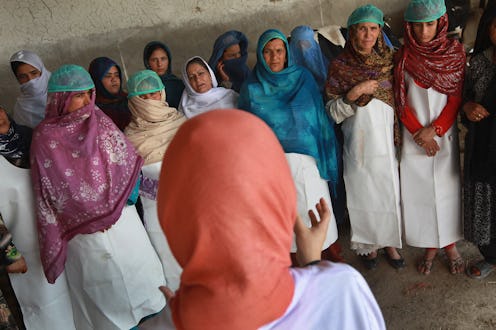News
The Struggles Of Afghan Women Go Well Beyond U.S. Bombs

On April 13, the U.S. military bombed what they believed to be ISIS fighters in caves in the Nangarhar province of Afghanistan, using a GBU-43/B Massive Ordinance Air Blast bomb (commonly nicknamed the Mother of All Bombs), the most powerful non-nuclear weapon ever used in combat. The bombing came a whole 5,667 days after the United States first invaded Afghanistan in Operation Enduring Freedom after the September 11 attacks. Afghanistan has come a long way since the United States first sent its military to the country nearly 16 years ago. Back in 2001, the image in Americans' mind of the far-off region was of a woman in a burqa, constrained by a patriarchal society to the point of being unable to even be seen in public.
"A lot has changed. Women are part of society now," Manizha Naderi, Executive Director of Women for Afghan Women, tells Bustle. "They're civil servants. They work in NGOs. They work in schools. They go to school. They go to university. They're more aware of their rights so they dress as they want — if they want to wear a burqa they wear a burqa; if they want to wear jeans and a shirt, there's nobody forcing them to dress a certain way."
But despite the progress, women in Afghanistan still face many difficulties. The region has been a state of ongoing war for more than 15 years, and security is an ongoing fear for the women who live there.
"We are very committed to rebuilding Afghanistan, being part of change in Afghanistan," Noorjahan Akbar, an Afghan woman who came to the United States for college and now works for Women For Women International, tells Bustle. However, she notes that "the space to do that work is becoming more and more limited, due to insecurity."
Then there's this moment of guilt, where you think, 'Oh thank God my family's safe, but so many other people have lost their lives.'
Akbar shares the daily fears her family faces in Afghanistan. "In the morning, we leave the home not knowing if we'll come back at night," she says. "There have been instances where members of my family have missed a suicide attack by 10 to 15 minutes.
"And that's frustrating — when I'm there that's incredibly terrifying for me. But when I'm here, every time there's news I just jump. I get really really nervous, and then there's this moment of guilt, where you think, 'Oh thank God my family's safe, but so many other people have lost their lives.'"
In a country with such a long history of women's oppression, the horrors of war that affect the entire population can make things especially difficult for women.
"In modern wars, the women are also traumatized; killed and raped and affected," Laurie Adams, the president of Women for Women International, tells Bustle. "What war does to society — it breaks down social cohesion, it normalizes violence."
If you walk down downtown Kabul, or Jalalabad, or any of the major cities, you see women are sitting on the streets begging for money.
In Afghanistan, where the history of violent oppression of women is only now being cut off, 90 percent of Afghans believe domestic violence is a normal part of life, according to Adams. Things are often just as difficult for women when they escape the men who abuse them. The New York Times recently wrote about the plight of divorced women in Afghanistan, many of whom end up lying about their marital status to avoid the difficulties of dealing with the stigma.
War and bombing often creates widows, and while Afghanistan is in many ways a communal culture that endeavors to take care of those left behind, the life of a war widow is far from easy.
"Woman widows are marginalized because they're women in a patriarchal society," says Akbar. "And then they're marginalized because suddenly after their partner has died, they're head of the household. And traditionally, they have never been given skills to provide for their family. Many of them don't have formal education, they don't have skills, so suddenly their partner is killed, or dies, and then they are responsible for feeding entire families. If you walk down downtown Kabul, or Jalalabad, or any of the major cities, you see women are sitting on the streets begging for money."
None of us feel bold enough to invest in our future in that country, because we don't know if we will have a future.
And the progress that does happen still hits a wall when women in Afghanistan are forced to deal with ongoing fears about their own safety. Akbar tells an example from her own family. She says her mother did not want to buy a refrigerator because she was unsure if the family, which had been refugees before, would have to move again.
"None of us feel bold enough to invest in our future in that country, because we don't know if we will have a future," Akbar says. "None of that maters if there isn't that basic security. If you're not sure that you're going to be able to come home safely, that really impacts the way people live their lives."